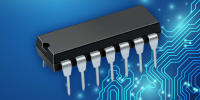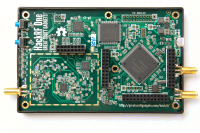
Undergraduate Program: Department of Informatics and Telecommunications, University of Peloponnese
Category: Core
ECTS Credits: Six (6)
Semester: First (1st)
Prerequisites: -
Teaching: Four (4) hours lectures, two (2) hour lab (per week).
At the end of the course the student will be able to:
Numeral systems and codes, digital circuits, principles and practices for combinatorial logic design, basic combinatorial digital circuits, PLAs, decoders, coders, multiplexers, comparators, adders, subtractors, ALUs, principles and practices for sequential digital design, latches, flip-flops,counters, shift registers, memory.
This is a compound course, with its total grade comprising theory (70%) and applied part (30%). Success in the applied part of the course must coincide or predate participation in the final theory exam. The applied part is graded through with laboratory exercises and written reports. Theory is graded through a written midterm exam (30%), a written examination at the end of the course (70%) and an optional semester project (40%).

Category: Specialization in Telecommunications-Elective
ECTS Credits: Five (5)
Semester: Sixth (6th)
Prerequisites: -
Teaching: Three (3) hours lectures, one (1) hour lab (per week).
Learning outcomes: At the end of the course the student will be able to:
Satellite orbit types and characteristics, orbital mechanics and orbits LEO, MEO, HEO, GEO, calculation methods for link budget, transponders, propagation impairments (free space loss, atmospheric, rain attenuation, shadowing), effects of noise, noise figure, antennas, transmission/reception techniques, multiple access techniques, random access, multibeam systems, simulation on orbit planning and link budget with STK software by Analytical Graphics (AGI). Exercises based on the STK and GNU Octave software packages.
Written exams at the end of the semester. Assignments may be given during the semester with weight 30% (in which case the weight of the written exams will be 70%).

Undergraduate Program: Department of Informatics and Telecommunications, University of Peloponnese
Category: Specialization in Telecommunications-Elective
ECTS credits: 5
Semester: 6th
Prerequisites: Probabilities and Statistics
By the end of this course students will:
Introduction, entropy, joint entropy, mutual information, information rate, redundancy, discrete message sources, memoryless sources, Markov sources, source coding, Huffman coding, communication channels, discrete channel capacity, continuous channel capacity, Galois field GF(2), linear block codes, Hamming codes, cyclic codes, systematic codes, BCH and CRC codes, burst error correcting codes.
Written exams at the end of the semester. Given projects have 30%-40% weight on the total course grade.

Undergraduate Program: Department of Informatics and Telecommunications, University of Peloponnese
Category: Specialization in Telecommunications-Elective
ECTS credits: 5
Semester: 8th
Prerequisites: Programming I or Programming II or Digital Communications or Signals and Systems
By the end of the course the student will be able to:
Telecommunication system design by using methods and techniques based on random process, fundamental computer simulation techniques, fading channel, error probability simulation, spectral analysis, Monte Carlo simulation, thermal noise, Rayleigh fading, software defined radio systems, simulation system development in GNU Octave and GNU Radio.
Written exams at the end of the semester with weight 60-40% and compulsory assignments during the semester with weight 40-60%.

Undergraduate Program: Department of Informatics and Telecommunications, University of Peloponnese
ECTS credits: 5
Semester: 5th
Requirement: Signals and Systems or Telecommunication Systems Fundamentals
By the end of this course students will:
Introduction, AWGN noise, line codes and spectra, baseband modulation techniques (PAM, PPM), signal algebra, constellation diagram, Nyquist filters, correlator and matched filter, intersymbol interference, probability of error and bandwidth requirements, optimum receiver design, maximum likelihood detectors, eye pattern, carrier modulation, coherent demodulation (ASK, PSK, FSK), non-coherent demodulation (DPSK, NCFSK), performance comparison.
Written exams at the end of the semester in both theoretical and laboratory parts with a percentage 70% and 30%, respectively. Optional midterm exams are also possible